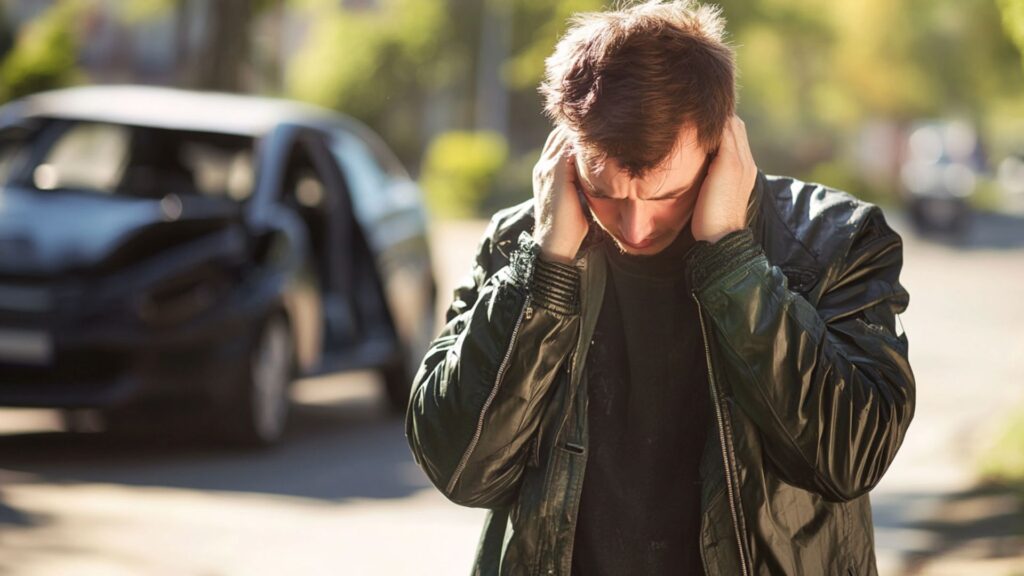Dizziness after an accident is a serious symptom that demands immediate attention. Car collisions can cause traumatic brain injuries (TBIs). These injuries often lead to dizziness and balance problems. It may seem like a minor issue. However, dizziness usually signals neurological damage, not just physical harm.
The brain controls balance, coordination, and spatial awareness. A sudden jolt or impact can disrupt these functions. Dizziness after an accident may result from damaged neural pathways or inner ear injuries. Concussions or diffuse axonal injuries are common in crashes. These affect brain signaling and lead to persistent vertigo or imbalance.
Ignoring dizziness can worsen outcomes. It may indicate swelling, bleeding, or other brain issues. These conditions require urgent care. Neurological damage can cause long-term problems like chronic dizziness or cognitive issues. Early evaluation by a specialist is critical. MRIs or balance assessments can pinpoint the cause. Addressing dizziness after an accident promptly supports recovery and prevents complications.
Key Signs of the Problem
Dizziness following an accident is a critical warning sign of potential brain trauma. It is often overlooked due to its seemingly mild nature. This symptom may manifest as dizziness, lightheadedness, or disorientation. It frequently indicates underlying neurological issues, particularly after car collisions. A sudden impact can jolt the brain and disrupt its normal function. This leads to concussions or more severe conditions like TBI.
Early recognition of dizziness is vital for timely medical intervention. Delayed treatment can make neurological damage worse. It can also prolong recovery or lead to permanent complications. Prompt assessment by a healthcare professional is crucial. It ensures proper diagnosis and management, improving outcomes.
Here are the signs linked to head injury and vertigo:
- Persistent Vertigo. Feeling the world spins or tilts. This is a key sign of head injury and vertigo. It disrupts balance and daily tasks.
- Nausea or Vomiting. Confusion after an accident often causes nausea. Vomiting may follow. These suggest brain or inner ear damage.
- Balance Problems. Trouble walking or standing steady. This reflects a head injury and vertigo, increasing fall risks.
- Headaches. Ongoing or worsening headaches that accompany dizziness after an accident. They may signal brain inflammation.
- Confusion. Difficulty focusing or feeling disoriented. This ties to head injury and vertigo, affecting cognitive clarity.
- Ringing Ears or Hearing Issues. Ringing in the ears or muffled hearing. These signs are generally linked to dizziness after an accident. They indicate neurological disruption.
These symptoms highlight head injury and vertigo as signs of brain injury. They require prompt medical evaluation. Brain imaging or balance tests can confirm damage. Early intervention prevents worsening effects.
What Causes It Neurologically?
Balance problems after a car crash can signal severe neurological damage. Immediate specialist attention is critical for specific neurological symptoms. Here are symptoms requiring urgent consultation:
- Concussion. A head impact disrupts brain function, leading to neurological dizziness. Individuals experience problems with coordination.
- Diffuse Axonal Injury. Shearing forces tear brain fibers during crashes. This causes balance issues and disrupts neural signals.
- Inner Ear Damage. Inner ear injury affects balance systems. It is a primary neurological cause of dizziness that triggers vertigo.
- Brain Swelling. Post-crash inflammation increases pressure inside the skull. This contributes to balance issues and affects coordination.
- Cervical Spine Injury. Neck trauma impacts brain signals. This neurological cause leads to imbalance and coordination problems.
Neurologists provide advanced diagnostics like MRIs and balance tests. They address balance issues with tailored treatments after a car crash. For post-crash lightheadedness, they offer medication or therapy plans. Inner ear trauma may require vestibular rehabilitation or repositioning maneuvers. Early specialist care prevents chronic complications. Doctors monitor progress to adjust treatments as needed. Seeking help promptly for these symptoms ensures better recovery outcomes.
Identifying Damage Early
Recognizing post-crash lightheadedness is vital for detecting hidden brain injuries. Car accidents can cause subtle neurological damage that may not be immediately obvious. Early identification improves treatment success significantly. Here are signs revealing potential injuries:
- Persistent Dizziness. Ongoing lightheadedness or spinning sensations after crashes. This post-crash lightheadedness suggests brain or inner ear damage.
- Balance Issues. Difficulty walking or standing steadily after an accident. This indicates inner ear trauma and can increase fall risks.
- Nausea. Feeling sick or vomiting after a crash. This ties to post-crash lightheadedness and signals neurological disruption.
- Hearing Changes. Ringing ears or muffled sounds after accidents. These are signs of inner ear trauma and point to vestibular injury.
- Visual Disturbances. Blurred or double vision after a collision. This reflects post-crash lightheadedness and suggests brain involvement.
Monitoring symptoms reveals hidden brain damage from car accidents. Inner ear trauma from crashes often signals concussions or vestibular injuries. These cause dizziness or imbalance problems. Symptoms like persistent vertigo, nausea, or confusion may emerge gradually. These indicate underlying neurological issues that need attention.
Brain imaging, such as MRIs or CT scans, detects brain swelling or nerve damage. Balance tests assess inner ear function, pinpointing trauma locations. Early specialist care prevents worsening symptoms over time. This includes neurological evaluations or vestibular therapy programs. Ignoring signs risks long-term complications like chronic dizziness or cognitive problems. Regular checkups track recovery progress effectively.
Diagnosis Methods You Should Know

Diagnosing brain injury and related dizziness is crucial for effective treatment. Medical examinations can uncover hidden neurological damage from car accidents, and early detection significantly improves recovery outcomes.
Key diagnostic dizziness methods after an accident include:
- Neurological Examination. Doctors assess balance, coordination, reflexes, vision, and hearing to detect signs of brain injury and dizziness.
- CT Scan. This imaging technique reveals brain swelling, bleeding, or skull fractures, making it essential for diagnosing accident-related injuries.
- MRI Scan. Detailed brain images show tissue damage and can detect inner ear or nerve fiber injuries, confirming the causes of post-accident dizziness.
- Balance Testing. Specialized tests evaluate inner ear function through balance and eye movement assessments. Abnormal results indicate dizziness from inner ear trauma crash.
- Glasgow Coma Scale. This standardized assessment measures consciousness levels by evaluating eye, verbal, and motor responses. Lower scores indicate more severe brain injury.
- Dix-Hallpike Maneuver. This specific test can trigger vertigo to assess inner ear problems. Positive results link post-accident dizziness to trauma.
- Blood Biomarkers. Laboratory tests measure proteins like S100B, and elevated levels indicate brain damage, supporting the diagnosis of brain injury.
These diagnostic tools help determine the extent of neurological damage. Accurate diagnosis guides treatment plans, including appropriate medications and therapy. Medical specialists use these assessments to effectively address brain injury and related dizziness. Regular follow-up evaluations monitor recovery progress and allow for treatment adjustments as needed.
Treatment Options
Treating dizziness after an accident requires specialized neurological care. Addressing the neurological causes of dizziness improves patient outcomes, and rehabilitation therapy plays a key role in recovery.
Treatment options include:
- Medication. Anti-vertigo medications can reduce dizziness after an accident, while antidepressants may help manage related anxiety. These target the underlying neurological causes.
- Vestibular Rehabilitation. Specialized exercises improve balance and help retrain the brain to compensate for injury. This therapy effectively addresses head injury-related balance problems and reduces unsteadiness.
- Cognitive Therapy. Mental training enhances focus and memory, helping patients cope with the cognitive effects of neurological dizziness. Regular sessions provide significant support for mental clarity.
- Canalith Repositioning. Techniques like the Epley maneuver treat vertigo caused by head injuries by repositioning particles in the inner ear, reducing causes of neurological dizziness.
- Physical Therapy. Strength and coordination exercises aid recovery by addressing post-accident dizziness and improving overall mobility.
- Counseling. Psychological support addresses emotional distress and helps patients manage stress related to their condition, supporting overall mental health.
- Lifestyle Modifications. Adequate rest and proper hydration aid recovery. Avoiding triggers like bright lights can reduce symptoms, supporting the management of neurological dizziness.
Specialized neurological care is essential for post-accident dizziness. Medical specialists develop individualized treatment plans for head injuries and related balance problems. Regular therapy sessions improve both balance and cognitive function. Consistent monitoring ensures effective treatment, and early intervention prevents chronic issues. Support groups provide valuable emotional assistance, and comprehensive care enhances overall recovery.
When to Seek Specialist Care
Car crash balance issues can indicate severe neurological damage requiring immediate medical attention. Certain symptoms require urgent specialist consultation:
- Severe Vertigo. Intense, persistent spinning sensations that indicate serious balance system damage require vestibular testing for proper diagnosis.
- Frequent Fainting. Sudden loss of consciousness or near-fainting episodes are signs of significant neurological problems requiring immediate evaluation.
- Worsening Coordination. Difficulty walking or frequent stumbling indicates possible brain or inner ear trauma crash that needs advanced imaging studies.
- Sudden Hearing Loss. Rapid onset of hearing problems or tinnitus requires evaluation of auditory nerve pathways.
- Persistent Nausea. Ongoing vomiting or severe nausea may signal brain injury and requires blood tests to detect injury markers.
- Cognitive Decline. Increasing confusion or memory problems related to the accident require cognitive assessments for proper evaluation.
Neurological specialists provide advanced diagnostic testing including MRIs and comprehensive balance evaluations. They develop tailored treatment plans that may include medications, therapy programs, vestibular rehabilitation, or specialized positioning techniques. Early specialist intervention prevents chronic complications, and ongoing monitoring allows for treatment adjustments as recovery progresses. Seeking prompt medical attention for these symptoms ensures the best possible recovery outcomes.
